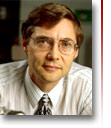|  Carl
Wieman Carl
Wieman
Nobel Laureate
Distinguished Professor of Physics
University of Colorado
Boulder, CO
Talk
Title: Bose-Einstein Condensation: Quantum weirdness at the
lowest temperature in the universe
Abstract
In
1924 Einstein predicted that a gas would undergo a dramatic
transformation at a sufficiently low temperature (now known
as Bose-Einstein condensation or BEC). In 1995, my group was
able to observe this transformation by cooling a gas sample
to the unprecedented temperature of less than 100 billionths
of a degree above absolute zero. The BEC state is a novel
form of matter in which a large number of atoms lose their
individual identities and behave as a single quantum entity,
the "superatom". This entity is the atom analogue to laser
light, and, although large enough to be easily seen and manipulated,
exhibits the nonintuitive quantum behavior normally important
only at much tinier size scales. The study and use of the
curious properties of BEC has now become an important subfield
of physics. I will discuss how we create BEC and some of the
subsequent research we have done on it. Interactive applets
as a tool for teaching science will be demonstrated in the
presentation.
Biographical
Sketch
Carl Wieman grew up in the forests of Oregon and received
his B.S. from the Massachusetts Institute of Technology in
1973 and his Ph.D. from Stanford University in 1977. He has
been at the University of Colorado since 1984 where he is
currently a Distinguished Professor of Physics and a Fellow
of JILA. He has carried out research in a variety of areas
of laser spectroscopy, including using laser light to cool
atoms. This led to cooling atoms sufficiently to attain Bose-Einstein
condensation in a vapor, for which he was awarded the Nobel
Prize in Physics in 2001, as well as numerous other awards.
He has worked on a variety of innovations in teaching physics
to a broad range of students, including the Physics Education
Technology Project, which creates online interactive simulations
for learning physics (http://www.colorado.edu/physics/phet)
. He is a 2001 recipient of the National Science Foundation’s
Distinguished Teaching Scholar Award and a member of the National
Academy of Sciences, the Board of Physics and Astronomy, the
Committee on Undergraduate Science Education and the National
Task Force on Undergraduate Physics. He has also been nominated
as Chair of the Board on Science Education at the National
Academies.
|